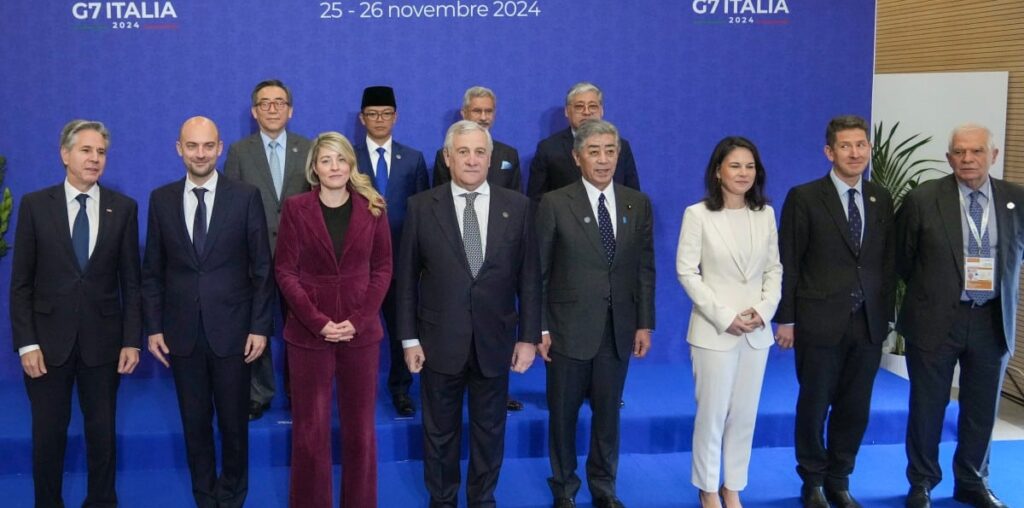

(L-R first row) US Secretary of State Antony Blinken, France’s Foreign Affairs Minister Jean-Noel Barrot, Canada’s Foreign Affairs Minister Melanie Joly, Italy’s Foreign Minister Antonio Tajani, Japan’s Foreign Minister Takeshi Iwaya, Germany’s Foreign Affairs Minister Annalena Baerbock, Britain’s Foreign Office Political Director Christian Turner, European Union for Foreign Affairs and Security Policy Josep Borrel.
(L-R second row) South Korea’s Foreign Minister Cho Tae-yul, Indonesias Foreign Minister Sugiono, India’s Foreign Minister Subrahmanyam Jaishankar, Philippines’ Foreign Minister Enrique Manalo pose for a family photo at the G7 of foreign Ministers in Fiuggi, south-east of Rome, on November 26, 2024. Agence France-Presse
MANILA, Philippines – The Philippines has welcomed the Group of Seven’s (G7) “unwavering commitment” to a rules-based order in the West Philippine Sea and the wider Indo-Pacific region.
In the final G7 Foreign Ministers’ statement issued on Nov. 26, the seven states — Italy, Germany, the United Kingdom, Canada, France, the United States, and Japan— said they “remain seriously concerned about the situation in the East and South China Seas.”
They underscored that there is “no legal basis for China’s expansive maritime claims in the South China Sea” and again opposed Beijing’s “militarization and coercive and intimidation activities in the South China Sea” in the area.
READ: DFA’s Manalo to represent the Philippines at G7 meet in Italy
Foreign Affairs Secretary Enrique Manalo, who participated in the G7 ministerial meeting in Italy on the same day, emphasized that the state of the Indo-Pacific concerns the entire world.
Article continues after this advertisement
“The state of the Indo-Pacific concerns us all. That’s why at the G7 Foreign Ministers’ Meeting, I conveyed the Philippines’s views on Indo-Pacific/South China Sea issues and the situation our people face in the West Philippine Sea,” he said.
Article continues after this advertisement
“I thank the G7 for their support for Philippines’ principled position, that bolstering a maritime order in the South China Sea, anchored on UNCLOS, is critically important to maintaining the rules-based order in the Indo-Pacific.”
READ: G7 slams China; PH gov’t warns vs Beijing ‘puppets’
This was the first time that the Philippines participated in a G7 meeting, with Manalo speaking at an expanded session on Indo-Pacific together with South Korea, India, and Indonesia.
At the forum, he delivered an intervention titled “Building a Rules-based Maritime Order in the Indo-Pacific” that sought for G7’s sustained commitment, as well as support for Asean centrality in the region.
Manalo also said Manila would be steadfast in promoting international law and diplomacy, especially in managing differences in the South China Sea.
“As for the G7 cause, they already have this (similar kind of commitment) but we want this to be sustained — we are encouraging them na huwag bibitaw (to sustain it),” Foreign Affairs Assistant Secretary for European Affairs Maria Elena Algabre told the Philippine News Agency when asked what recommendations the Philippine delegation to G7 has put forward.
“Their commitment on that is unwavering because more than 30 percent of global maritime trade passes through the South China Sea so it does not only concern us but also them.”
Algabre said Manila’s participation in the G7 aligns with the government’s initiative on transparency and increasing public awareness of the situation in the West Philippine Sea.
“This is part of our program on transparency and increasing public awareness on the actual situation on the ground so as to counter false narratives and in a way create a more viable foundation for diplomacy to work,” she said.
On top of the G7 meeting, Manalo also held bilateral meetings with his counterparts Japanese Foreign Minister Iwaya Takeshi and Italian Foreign Minister Antonio Tajani.
He also met with the Secretary of State Antony J. Blinken, Indonesian Foreign Minister Sugiono, Canadian Foreign Minister Mélanie Joly diplomats on the margins of the event.
For comprehensive coverage, in-depth analysis, visit our special page for West Philippine Sea updates. Stay informed with articles, videos, and expert opinions.

